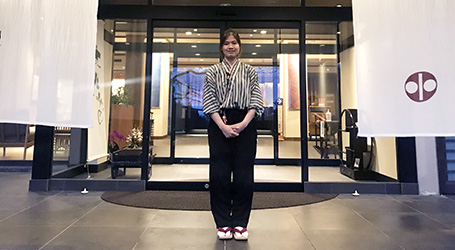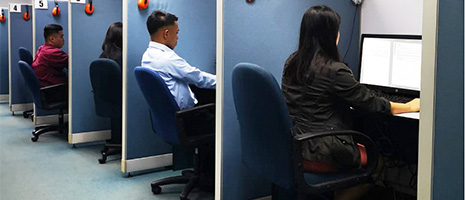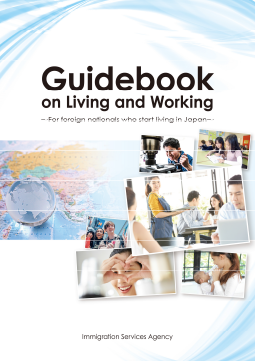March 2020
Specified Skilled Worker: New Status of Residence

As a new status of residence, “Specified Skilled Worker” was established in April 2019.
“Specified Skilled Worker” is a new status of residence established in April 2019 for foreign nationals seeking to reside in Japan for the purpose of employment. Foreign nationals who have acquired a status of Specified Skilled Worker can work in fourteen specified industrial fields (see table) (https://www.moj.go.jp/isa/policies/ssw/nyuukokukanri01_00127.html).
|
Specified industrial fields in which foreign nationals with Specified Skilled Worker status can work Nursing Care, Building cleaning management, Machine parts & tooling industries, Industrial machinery industry, Electric, electronics and information industries, Construction industry, Shipbuilding and ship machinery industry, Automobile repair and maintenance, Aviation industry, Accommodation industry, Agriculture, Fishery & aquaculture, Manufacture of food and beverages, Food service industry. |
As of February 2020, the Japanese government has concluded a Memorandum of Cooperation (MOC) with twelve countries, primarily in Asia, to ensure the proper sending and acceptance of foreign nationals as Specified Skilled Workers, not least to eliminate malicious intermediary organizations. However, it is generally possible for foreign nationals of any country, whether or not that country has executed an MOC with Japan and irrespective of whether it is a developing or a developed country, to acquire Specified Skilled Worker status. As of December 31, 2019, foreign nationals with Specified Skilled Worker status number 1,621 and hail from seventeen countries and regions, including Asia, Europe and South America. Japan is expected to accept up to 345,000 foreign nationals as Specified Skilled Workers over the next five years.
Specified Skill Exam
In order to work in Japan with the new status, foreign nationals need to take both a skill exam and a Japanese language proficiency test. Skill exams are conducted several times a year for each field in order to measure whether foreign nationals possess a degree of knowledge or experience in the specified industrial fields in which they desire to work. Skill exams are conducted in Japanese, using Computer Based Testing (CBT), in which questions are set and answered using a computer, or pen-and-paper testing. Practical tests are also conducted for some fields. The first exams have already been conducted in a number of specified industrial fields, with exams in all fields scheduled to be available by March 31, 2020. From April 2020, foreign nationals who have entered Japan as a temporary visitor for the purpose of taking the exam will also be able to take the skill exam.

The Japanese language proficiency test is conducted through the Japan Foundation Test for Basic Japanese (JFT-Basic), newly established in April 2019 and held several times a year. Test-takers are required to achieve a result that demonstrates adequate proficiency in Japanese at the A2 level, using the “ability to engage in everyday conversation to a certain extent and handle daily life without difficulties” as a guideline. Alternatively, they need to take the Japanese Language Proficiency Test (JLPT) conducted twice a year by the Japan Foundation and Japan Educational Exchanges and Services and be certified at the N4 (the ability to understand basic Japanese) level or higher. Under the foreign Technical Intern Training system, foreign nationals who have completed technical intern training (ii) or the technical intern training (iii) are exempt from the skill exam and Japanese language proficiency test.
Foreign nationals who formally acquired Specified Skilled Worker status after some procedures such as conclusion of an employment contract, application for a visa, and issuance of the status can receive support from the accepting organization (employer) or from a registered supporting organization entrusted by the accepting organization to ensure a safe and comfortable living and working environment in Japan. Such support includes, for example, airport pick-up when entering the country; assistance with procedures and formalities associated with tasks such as securing housing, opening a bank account, and making a mobile phone contract; providing Japanese language learning opportunities; holding orientation sessions to explain aspects of Japanese life such as etiquette and how to use public institutions; providing information on Japanese cultural traditions and local events; and providing consultations on living and working in Japan.
Initiatives for a society of harmonious coexistence
Japan is aiming to achieve a society of harmonious coexistence where Japanese and foreign nationals can coexist safely and in peace by receiving foreigners in an appropriate manner. To that end, the Immigration Services Agency of Japan has assigned “Accepting Environmental Coordinators” in eight regional immigration bureaus and three district immigration services across Japan. These officers are charged with duties such as listening to the opinions of regional public bodies and other relevant organizations and offering consultations on how to improve the environment to accommodate foreign nationals.
In addition, the Immigration Services Agency of Japan in cooperation with the relevant Ministries and Agencies has put together a “Guidebook on Living and Working.” The guidebook contains a wide range of information necessary for living in Japan, such as procedures for entry/residence, childbirth/parenting, education and taxes.

Further, in collaboration with the relevant Ministries and Agencies, a center for supporting foreign residents will be established in 2020 in Yotsuya, Shinjuku City, Tokyo as a hub for the comprehensive promotion of harmonious coexistence with foreign nationals. The Center will provide wide-ranging support, including the acceptance of international students and facilitating their employment in Japan, safeguarding the human rights of foreigners, consultations relating to legal problems and visas, and promoting the employment of foreign nationals in Japan including in rural areas.
A Daily Life Support Portal for Foreign Nationals
https://www.moj.go.jp/isa/support/portal/index.html

